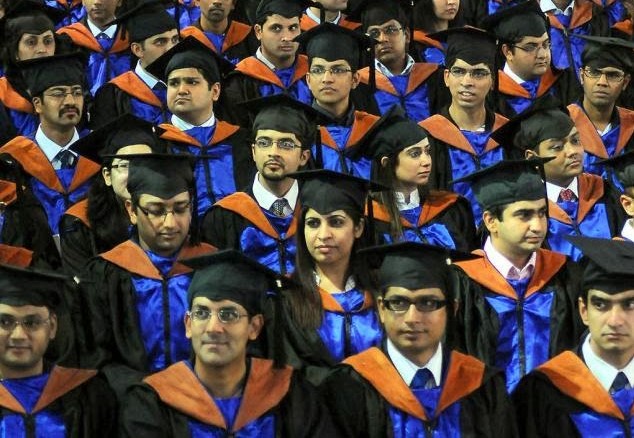Mohamed Yousuf
By
Bikash Mohapatra
With a proud legacy, exciting prospects and a proactive government, this is India’s best chance to make it count and become the education capital of the planet
Some facts to begin with:
India was the preferred destination for learning for more than 2,500 years.
Nalanda was the world’s first university.
Takshashila University, established around 2,700 years ago in what is now Pakistan, was home to over 10,500 students from around the world.
If there had been a ranking at the time, the probability of most, if not all of the top 10 slots being occupied by Indian universities was very high.
That was then.
Now for some more facts:
Tiny Singapore has five universities in the top 100. India has none.
Only around 35,000 overseas students come to India to pursue higher studies.
More importantly, most of the Indian students prefer destinations like the United States, United Kingdom, Australia and New Zealand to complete their higher education.
To put matters into perspective the present scenario is not exactly a positive one.
How can India attempt to lure overseas students when its own brains are opting for foreign shores to finish their education?
Can India even dream of reclaim its legacy? If experts are to be believed the answer is a resounding YES. For the present might not look as favorable but the future does offer a lot of potential. And when it comes to India, hope floats.
“I believe there’s a market in India for international students,” says Diptiman Das, Chairman and Managing Director of EdCIL (India) Limited, a Public Sector Enterprise whose flagship program Study in India attempts to encourage overseas students to pursue higher education in Indian universities.
“The onus of getting them to study in India would rest on three pillars; 1) Regulation, 2) Infrastructure and 3) Marketing. I believe we can do it,” he adds.
Nicholas Booker, CEO & Co-Founder of IndoGenius, concurs.
“India is going to be the education capital of the planet in the coming decades,” he says, adding, “I believe there are three things that are needed to be considered in this regard.”
Booker proceeds to elaborate on his point.
“First, one has to learn about India. It is a country of a billion-plus people, and from a human point of view, it is impossible not to know about it. You can’t learn about India without being in India,” he explains.
“Secondly, it is regarding the economy. It has taken India 70 years since independence, but India is finally overtaking the United Kingdom. In another 10 years India will overtake most of the European countries and in another 30 years, it will probably overtake the United States to become the world’s largest economy.
“Third, the Western world is going through a crisis at the moment, a period of relative decline. The state of science and research is not progressing.
“In their pursuit of happiness America has ended up with Donald Trump. In their quest for unity the European Union has become more disunited.
“India doesn’t have such problems. In fact, it offers hope, and an exciting and innovative ecosystem. In such a scenario India will be coming up with a low cost solution for education.”
On the positive side the incumbent (Narendra Modi) government has not only been quick to realize India’s vast potential in the education sector but has also begun working towards making India a preferred destination, an education hub so to speak.
“India has always been an educational hub and a ‘bright spot’ in the realm of studies. People came to India to learn and we do have a legacy,” says Prakash Javadekar, Minister for Human Resource Development, Government of India.
“We can achieve it again and ought to make positive effort towards that end. The United States has developed a very good education-based business model and we need to have something like that,” he adds.
Booker believes India’s prospects of becoming an education hub are realistic.
“I think the target is to get around five million international students to study in India in the next few years, and it wouldn’t take long to achieve that number,” he avers. Javadekar, though hopeful, albeit prefers a more pragmatic approach.
“We have to improve the quality of education in our universities and develop an innovation culture.
“World class is not a title that can be given. You have to earn it. This is probably India’s best chance to become a global education hub and we need to make it count.”



"Tiny Singapore has five universities in the top 100. India has none". India has no way to prosper as it is failing since independence from the British. India has become a global leader in corruption, mockery, lawlessness, discrimination (untouchables), highly politicized environment. British should have dismantled India like it was prior to Western colonialism in order for each race to live with peace, dignity, respect, human rights and freedom. Singapore is one of the most highly disciplined states and main architects were Progressive Chinese and Eelam Tamils. I still remember same disciplined life was in Eelam until early 1960s. Now India and Sri Lankan are partners in state correct, human rights abuses, lawlessness and highly politicized environment. Only God can help!